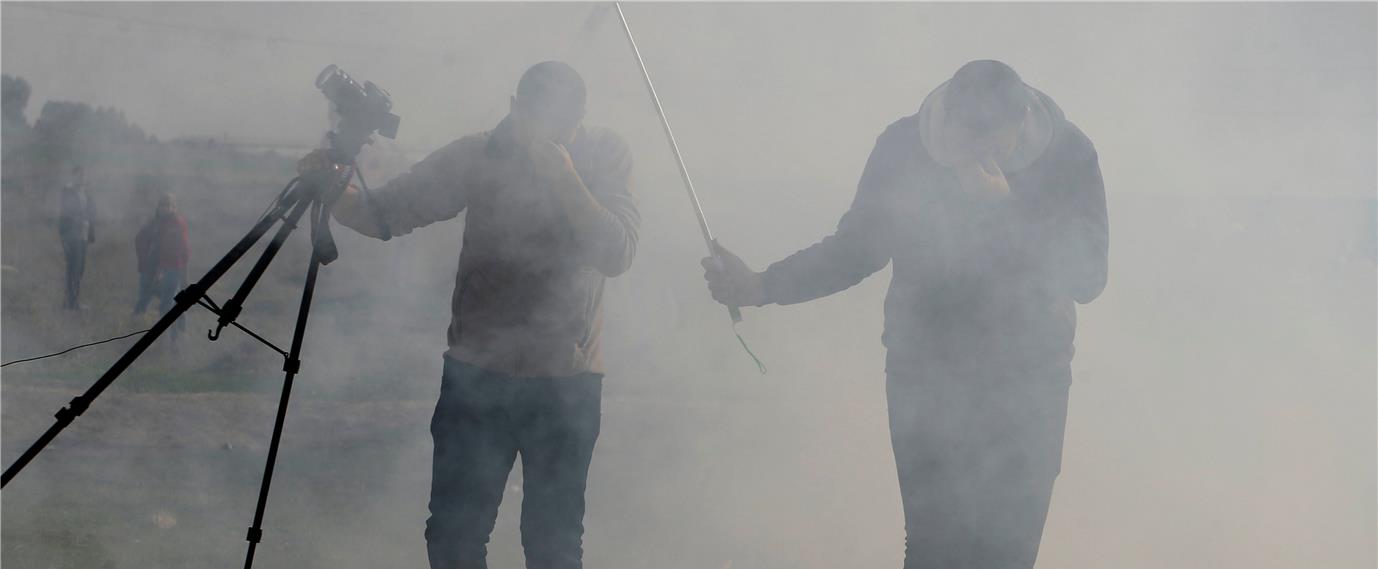حروب ونزاعات وصراعات، حراك وثورة وثورة مضادة.. باتت تلك المصطلحاتت مرادفة للصحافة العربية في السنوات السبع الأخيرة، وإن كانت حاضرة قبل ذلك، لكنها الآن أشد كثافة.
الصحفيون في مصر وسوريا واليمن وتونس وليبيا، قبل فترة بسيطة فقط، لم يكونوا مستعدين لتغطية اشتباكات اندلعت فجأة، بعضها هدأ وآخر ازداد حتى تحولت المظاهرات لاشتباكات فحروب وجد الصحفي نفسه فجأة في قلبها، دون سابق معرفة في تغطيات الحروب.
ومن تلك الحاجة لمعرفة القصص والتجارب التي مرَّ بها صحفيون غطوا الحروب في مناطق عربية، ومعرفة كيفية تعاملهم معها، وما على الصحفي اتباعه أو تجنبه، جاء كتاب "الصحافة في زمن الحرب" الصادر عن "معهد الجزيرة للإعلام"، ليقدّم خلاصة تجارب صحفيين ومواطنين صحفيين نقلوا أخبار الحروب، في ظروف استثنائية.
ويهدف الكتاب، بحسب محرِّريْه عواد جمعة وخالد رمضان، لـ"إتاحــة الفرصــة للقــارئ للاســتفادة هــذه التجــارب والتعلــم مــن هــذه الخبــرات، بمــا يســاعد علــى تطويــر المهــارات واســتراتيجيات التعامــل مــع مختلــف الظــروف فــي العمــل الصحفــي". ويتابعان في تقديمهما للكتاب "لا شــك أن إخبــار العالــم القصــص المخبــأة فــي كل حــرب ونــزاع مهمــة بالغــة الأهمية مــن أرضيــة أخلاقيــة صلبــةً، ودون الاســتهتار بجانــب الســلامة والأمــن. وهــذه هــي الخطــوة الأولــى نحــو المحافظــة علــى إنســانيتنا".
وفي تقديمه للكتاب، تحدث الأستاذ في جامعة كولومبيا الأميركية، حميد دباشي، عن خصوصية التغطية في العالم العربي، الذي ظل لفترة طويلة محكوما بسيطرة الأنظمة المستبدة عليه، إضافة للـ"حقائق البديلة" القادمة من السياسة والإعلام الغربيين، مشيرا إلى بروباغندا صحيفة النيويورك تايمز –مثلا- في تغطية الحرب ضد العراق، والتي ساهمت بشكل أو بآخر بالتحريض لتدمير بلد كامل.
وقد ساق الدباشي ذلك المثال، للتأكيد على أهمية أن تكون لدى العرب القدرة على التغطية الصحفية بأنفسهم، وأن تكون وسائلهم الإعلامية مرجعا موثوقا، وأن يكون للصحفي العربي القدرة على نقل شؤون المنطقة العربية بشكل دقيق، لا يعرقله حاجزا اللغة والثقافة، التي لم تمنع صحفيين أجانب من التغطية بالبلاد العربية، لكنها لم تكن –بحسب دباشي- تغطية أمينة بالكامل.
يؤكد الكتاب على أهمية سلامة الصحفي في تغطية الحروب، معرّجا على مخاوفه وانشغالاته، ومضيئا على ظروف العمل في العالمين العربي والإسلامي.
وقد أفرد الكتاب مساحة للحديث عن مشاركة المواطن الصحفي في التغطيات الحربية، والتي ساهمت بشكل فعّال في الوصول للكثير من المناطق التي عجز الصحفيون عن الوصول إليها، واحتفى الكتاب بتجاربهم، لاسيما أن الكثير منهم تصدرت أسماؤهم قوائم الشهداء والجرحى، بينما ما زال الأحياء منهم يعانون من نظرة دونية لأعمالهم ونقصان لحقوقهم.
شارك في الكتاب، إما بالكتابة المباشرة، أو بالمقابلات الصحفية التي أجراها المحرّران، مجموعة من الصحفيين الذين عايشوا ظروفا معقدة أثناء تغطياتهم، منهم تامر المسحال، إبراهيم صابر، زينة خضر، خالد فهيم، أميرة أحمد حرودة، ستيني هوكسبرو، بيتر غريتسي، بشراحبيل بشراحبيل، زينة ارحيم، أيدن وايت وكريستيان تريبرت. وهو بتنسيق من الزميلة ديانا لاريا.
للاطلاع على النسخة العربية، هنا:
للاطلاع على النسخة الإنجليزية، هنا:











































